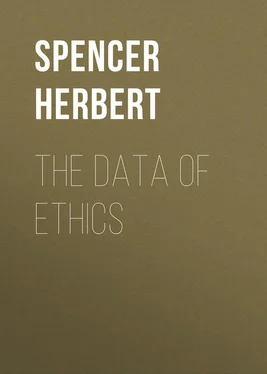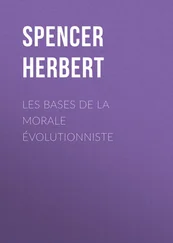Herbert Spencer - The Data of Ethics
Здесь есть возможность читать онлайн «Herbert Spencer - The Data of Ethics» — ознакомительный отрывок электронной книги совершенно бесплатно, а после прочтения отрывка купить полную версию. В некоторых случаях можно слушать аудио, скачать через торрент в формате fb2 и присутствует краткое содержание. Жанр: Философия, foreign_antique, foreign_prose, на английском языке. Описание произведения, (предисловие) а так же отзывы посетителей доступны на портале библиотеки ЛибКат.
- Название:The Data of Ethics
- Автор:
- Жанр:
- Год:неизвестен
- ISBN:нет данных
- Рейтинг книги:4 / 5. Голосов: 1
-
Избранное:Добавить в избранное
- Отзывы:
-
Ваша оценка:
- 80
- 1
- 2
- 3
- 4
- 5
The Data of Ethics: краткое содержание, описание и аннотация
Предлагаем к чтению аннотацию, описание, краткое содержание или предисловие (зависит от того, что написал сам автор книги «The Data of Ethics»). Если вы не нашли необходимую информацию о книге — напишите в комментариях, мы постараемся отыскать её.
The Data of Ethics — читать онлайн ознакомительный отрывок
Ниже представлен текст книги, разбитый по страницам. Система сохранения места последней прочитанной страницы, позволяет с удобством читать онлайн бесплатно книгу «The Data of Ethics», без необходимости каждый раз заново искать на чём Вы остановились. Поставьте закладку, и сможете в любой момент перейти на страницу, на которой закончили чтение.
Интервал:
Закладка:
Even with those who judge of conduct from the religious point of view, rather than from the ethical point of view, it is the same. Men who seek to propitiate God by inflicting pains on themselves, or refrain from pleasures to avoid offending him, do so to escape greater ultimate pains or to get greater ultimate pleasures. If by positive or negative suffering here, they expected to achieve more suffering hereafter, they would not do as they do. That which they now think duty they would not think duty if it promised eternal misery instead of eternal happiness. Nay, if there be any who believe that human beings were created to be unhappy, and that they ought to continue living to display their unhappiness for the satisfaction of their creator, such believers are obliged to use this standard of judgment; for the pleasure of their diabolical god is the end to be achieved.
So that no school can avoid taking for the ultimate moral aim a desirable state of feeling called by whatever name – gratification, enjoyment, happiness. Pleasure somewhere, at some time, to some being or beings, is an inexpugnable element of the conception. It is as much a necessary form of moral intuition as space is a necessary form of intellectual intuition.
CHAPTER IV.
WAYS OF JUDGING CONDUCT
§ 17. Intellectual progress is by no one trait so adequately characterized as by development of the idea of causation, since development of this idea involves development of so many other ideas. Before any way can be made, thought and language must have advanced far enough to render properties or attributes thinkable as such, apart from objects; which, in low stages of human intelligence, they are not. Again, even the simplest notion of cause, as we understand it, can be reached only after many like instances have been grouped into a simple generalization; and through all ascending steps, higher notions of causation imply wider notions of generality. Further, as there must be clustered in the mind concrete causes of many kinds before there can emerge the conception of cause, apart from particular causes, it follows that progress in abstractness of thought is implied. Concomitantly, there is implied the recognition of constant relations among phenomena, generating ideas of uniformity of sequence and of co-existence – the idea of natural law. These advances can go on only as fast as perceptions and resulting thoughts are made definite by the use of measures, serving to familiarize the mind with exact correspondence, truth, certainty. And only when growing science accumulates examples of quantitative relations, foreseen and verified, throughout a widening range of phenomena, does causation come to be conceived as necessary and universal. So that though all these cardinal conceptions aid one another in developing, we may properly say that the conception of causation especially depends for its development on the development of the rest; and therefore is the best measure of intellectual development at large.
How slowly, as a consequence of its dependence, the conception of causation evolves, a glance at the evidence shows. We hear with surprise of the savage who, falling down a precipice, ascribes the failure of his foothold to a malicious demon; and we smile at the kindred notion of the ancient Greek, that his death was prevented by a goddess who unfastened for him the thong of the helmet by which his enemy was dragging him. But daily, without surprise, we hear men who describe themselves as saved from shipwreck by "divine interposition," who speak of having "providentially" missed a train which met with a fatal disaster, and who called it a "mercy" to have escaped injury from a falling chimney-pot – men who, in such cases, recognize physical causation no more than do the uncivilized or semi-civilized. The Veddah who thinks that failure to hit an animal with his arrow resulted from inadequate invocation of an ancestral spirit, and the Christian priest who says prayers over a sick man in the expectation that the course of his disease will so be stayed, differ only in respect of the agent from whom they expect supernatural aid and the phenomena to be altered by him: the necessary relations among causes and effects are tacitly ignored by the last as much as by the first. Deficient belief in causation is, indeed, exemplified even in those whose discipline has been specially fitted to generate this belief – even in men of science. For a generation after geologists had become uniformitarians in Geology, they remained catastrophists in Biology: while recognizing none but natural agencies in the genesis of the earth's crust, they ascribed to supernatural agency the genesis of the organisms on its surface. Nay more – among those who are convinced that living things in general have been evolved by the continued interaction of forces everywhere operating, there are some who make an exception of man; or who, if they admit that his body has been evolved in the same manner as the bodies of other creatures, allege that his mind has been not evolved but specially created. If, then, universal and necessary causation is only now approaching full recognition, even by those whose investigations are daily re-illustrating it, we may expect to find it very little recognized among men at large, whose culture has not been calculated to impress them with it; and we may expect to find it least recognized by them in respect of those classes of phenomena amid which, in consequence of their complexity, causation is most difficult to trace – the psychical, the social, the moral.
Why do I here make these reflections on what seems an irrelevant subject? I do it because on studying the various ethical theories I am struck with the fact that they are all characterized either by entire absence of the idea of causation, or by inadequate presence of it. Whether theological, political, intuitional, or utilitarian, they all display, if not in the same degree, still, each in a large degree, the defects which result from this lack. We will consider them in the order named.
§ 18. The school of morals properly to be considered as the still extant representative of the most ancient school, is that which recognizes no other rule of conduct than the alleged will of God. It originates with the savage whose only restraint beyond fear of his fellow man, is fear of an ancestral spirit; and whose notion of moral duty as distinguished from his notion of social prudence, arises from this fear. Here the ethical doctrine and the religious doctrine are identical – have in no degree differentiated.
This primitive form of ethical doctrine, changed only by the gradual dying out of multitudinous minor supernatural agents and accompanying development of one universal supernatural agent, survives in great strength down to our own day. Religious creeds, established and dissenting, all embody the belief that right and wrong are right and wrong simply in virtue of divine enactment. And this tacit assumption has passed from systems of theology into systems of morality; or rather let us say that moral systems in early stages of development, little differentiated from the accompanying theological systems, have participated in this assumption. We see this in the works of the Stoics, as well as in the works of certain Christian moralists. Among recent ones I may instance the Essays on the Principles of Morality , by Jonathan Dymond, a Quaker, which makes "the authority of the Deity the sole ground of duty, and His communicated will the only ultimate standard of right and wrong." Nor is it by writers belonging to so relatively unphilosophical a sect only that this view is held; it is held with a difference by writers belonging to sects contrariwise distinguished. For these assert that in the absence of belief in a deity, there would be no moral guidance; and this amounts to asserting that moral truths have no other origin than the will of God, which, if not considered as revealed in sacred writings, must be considered as revealed in conscience.
Читать дальшеИнтервал:
Закладка:
Похожие книги на «The Data of Ethics»
Представляем Вашему вниманию похожие книги на «The Data of Ethics» списком для выбора. Мы отобрали схожую по названию и смыслу литературу в надежде предоставить читателям больше вариантов отыскать новые, интересные, ещё непрочитанные произведения.
Обсуждение, отзывы о книге «The Data of Ethics» и просто собственные мнения читателей. Оставьте ваши комментарии, напишите, что Вы думаете о произведении, его смысле или главных героях. Укажите что конкретно понравилось, а что нет, и почему Вы так считаете.












